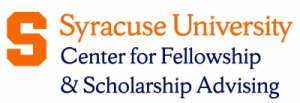Application Advice from Fulbright ETA Kait Hobson (’16)
2016 graduate Kaitlyn Hobson will leave for a yearlong Fulbright Teaching Assistantship to Thailand in a couple short months. Kait, a dual magazine and ETS major, worked closely with CFSA as she prepared her application. As Syracuse University seniors, graduate students, and alumni start drafting their essays for the 2016-2017 application cycle, CFSA asked Kait about her experiences applying for a Fulbright award.
What was the application process like?
The application is pretty intense. I love to write and I’m probably one of the only people who enjoys writing essays like personal statements. The application becomes a puzzle you have to put together so that the committee can see a full picture of who you are. The hardest part about the Fulbright is that, because it’s so competitive, everything needs to be as perfect as possible—I think I wrote about 15 drafts of my personal statement and maybe 20 drafts of the grant proposal.
What advice do you have for future Fulbright applicants? For other competitive scholarship applicants?
Start early! Seriously. I became progressively worse at procrastinating as college went on but you honestly cannot successfully apply for a Fulbright if you procrastinate. Be willing to take the advice of your mentors and don’t be scared to write draft, after draft, after draft… I promise it helps in the end. I would also recommend heavily researching the program and if you’re applying for a scholarship to a foreign country, be informed about international affairs, politics, etc. In the end, go with your instinct—the application reflects who you are and what you care about. It has to be honest. Only you will know in the end whether it’s both well-written and a true representation of who you are.
Did you learn anything about yourself during the application process?
Absolutely! When someone asks you to describe yourself in less than 1 page, you learn what’s most important about yourself and the skills you possess. I knew before I started this process that I was determined, but I think this process put my perseverance to the test. Having to rewrite entire portions of the application based on the feedback of my many mentors could at times be discouraging. If you decide to apply for something like this, you have to remain open and listen to the people helping you. You can’t give up when you need to keep adjusting your application.
Besides the award itself, did you gain anything (skills, experience, other tangible outcomes) through the application process?
The Fulbright interview is a great exercise for future job interviews. I was asked difficult questions and the interviewers expected me to be well-versed in current affairs and news. They asked me questions that I hadn’t considered before. I also learned how to both suspend my own opinion so that I could listen to the feedback of my mentors, while also listening to my instincts. No matter how much feedback you receive, at the end of the day you have to make the final decision about how you want to describe yourself and the ways in which you can contribute to your country of interest.
How did you work with CFSA?
I couldn’t have applied for this on my own and CFSA is the reason my application was successful. There is an impressive history of Fulbright winners from Syracuse and the staff at CFSA and the committee that helps students work on their Fulbright applications is top notch. There’s a small group of applicants; you become close with one another as well as the CFSA staff.
